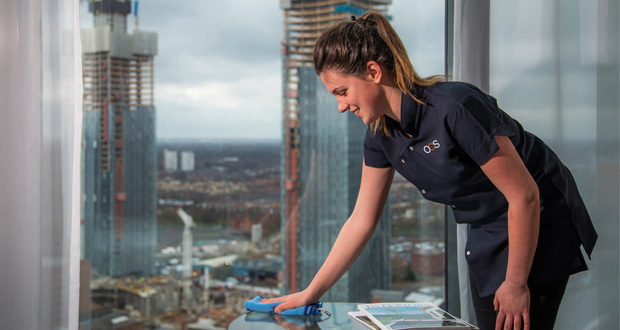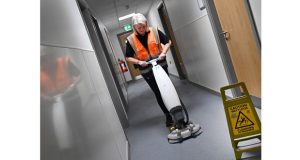By Yvonne Taylor, Global Head of Cleaning at OCS Group
Three changes of Prime Minister in a Government increasingly under pressure, a war between Russia and Ukraine, an NHS crisis, and a growing cost of living crisis, where increased costs of energy may additionally leave people and companies in a very difficult situation. This is the uncertain climate that we find ourselves in at the beginning of Q2 in 2023. And yet as a multi-billion-pound sector globally, the cleaning industry continues to grow, with 66,420 operating cleaning companies employing 941,000 people. In 2021, the cleaning sector employed approximately five per cent of the UK workforce making the industry one of the top 10 biggest employers within the UK, delivering over £58 billion to the UK economy.
It’s difficult to predict cleaning trends and influences in today’s unstable market however, employee training continues to be a high priority. Well-trained, educated cleaning operatives ensure a clean and safe environment which will contribute to employee’s well-being and support the reduction of staff sickness.
The cleaning industry has continued to be far more resilient than other sectors and emerging trends are all pointing to a number of key areas for 2023:
- Sustainable cleaning
- IOT to gain productivity
- Data to drive efficiencies
- Technology to support the workforce shortages
- Indoor air quality
- Special Services
Sustainable Cleaning
The importance of sustainability in the professional cleaning and hygiene industry has been growing for years, incorporating sustainability in your business strategy will likely improve trust with employees and investors, while protecting the environment. Sustainability is transitioning from being a “nice to have” to a “must have”.
We need to look at this area not only for sustainable products, but also eco-friendly solutions. Cleaning solutions should be ecologically beneficial – they should encourage using less water, reducing temperatures, looking at closed loop recycling products and reducing or removing plastic waste.
Internet of Things (IOT) to gain productivity
It’s no secret that the number of connected workplace devices is growing. Organisations of all sizes are building IOT ecosystems into their business strategy, with varying degrees of sophistication.
There are a number of associated ESG benefits from waste and recycling collection driven by solar energy; on-demand emptying; robotics driving chemical free cleaning and fleet management of equipment reducing the need for mobile engineers, subsequently reducing carbon emissions and increasing operations efficiencies.
Data to drive efficiencies
There is an emphasis on quantification of the workplace. Data from IOT devices and FM software helps the industry to understand more about the workplace and its environment to drive productivity. Data can be used to identify trends and drive efficiencies.
Technology to support the workforce shortages
The cleaning industry has been evolving for many years and with it, a big drive to robotics and automation. As technology continues to progress, it’s also changing the way people work, improving performance, productivity, and efficiency.
Indoor Air Quality
In the UK as mentioned there will be the Clean Air Bill, which calls for tight IAQ (Indoor Air Quality) standards that should be regulated. Furthermore, the National Engineering policy centre has called for a major reform of ventilation and purification to improve infection resilience across all buildings and public transport.
Better indoor air quality not only mitigates against the risk of airborne transmitted illnesses, including seasonal flu and Covid-19, it can significantly help hay fever suffers and asthmatics, therefore reducing absenteeism, reducing labour costs and delivering increased building occupant satisfaction.
Special Services
In 2022, we saw more and more cleaning businesses adding custom attachments or add-on’s like laundry and carpet cleaner. The importance of carpet care cannot be understated as it can improve the wellness of everyone in the vicinity as it will increase the indoor air quality, allergen control and will also project a clean image to your customers.
Staying ahead of the game
The cleaning industry is at the forefront of driving technology and innovation. We have taken on the role to support Hard FM, with regards to indoor air quality and energy efficiencies, whilst also championing ESG. We are embracing the use of technology, using on demand products providing data that can be analysed to enhance productivity, and seeking out more environmental products and processes. Technology is being used to counter the staffing shortage being felt across the cleaning industry, either through IOT and/or robotics.





